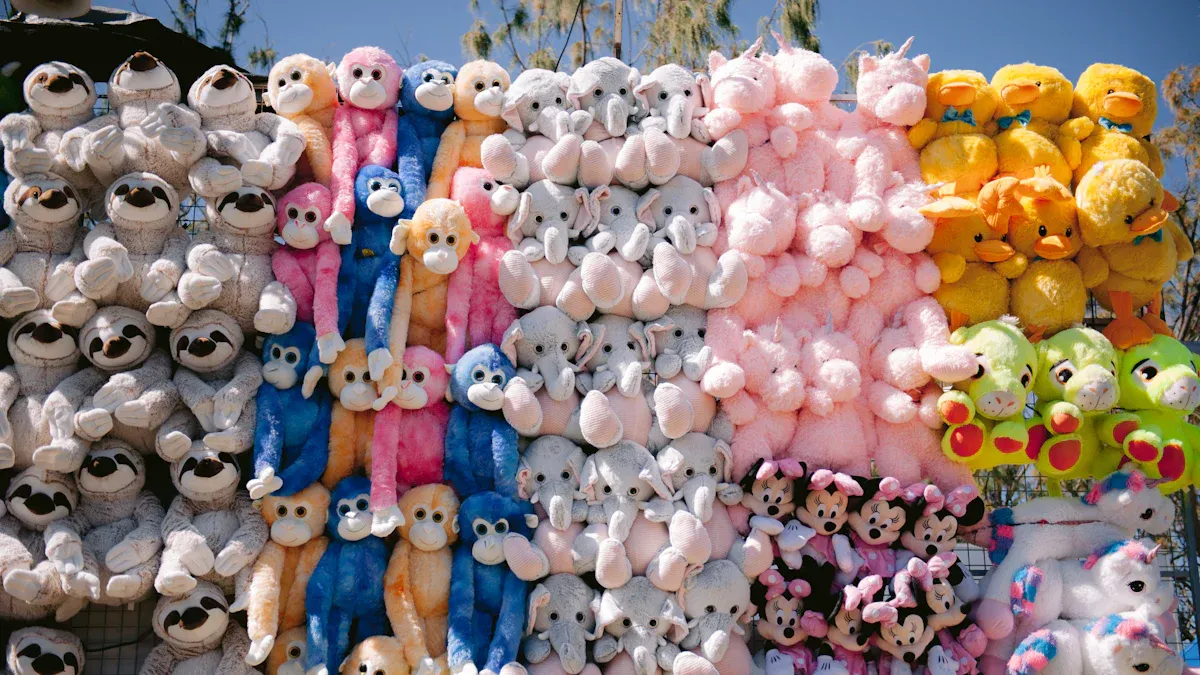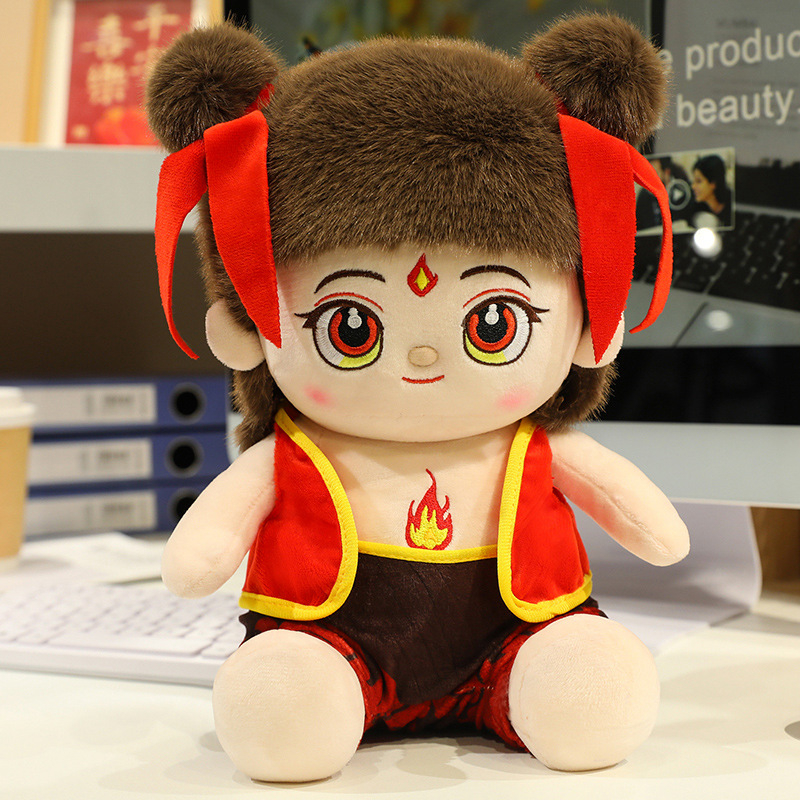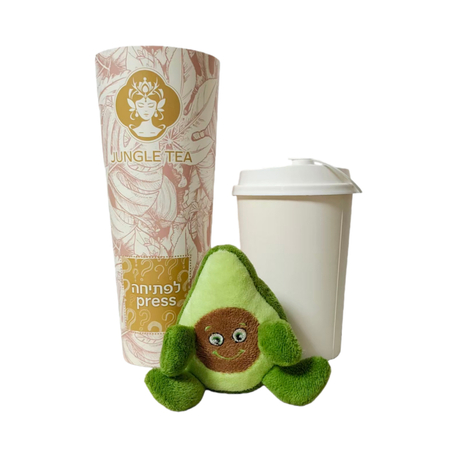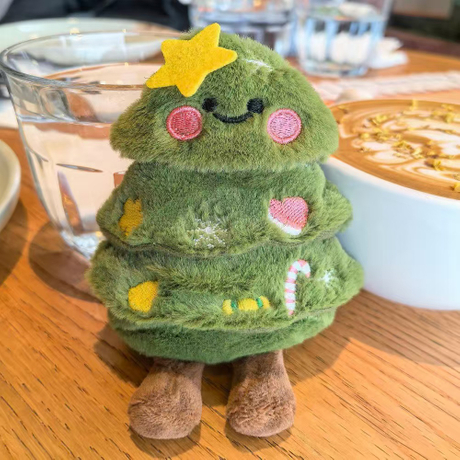Stuffed toys manufacturers help change the plush toys market with new ideas and focus on quality. The global stuffed toys market was worth USD 11.32 billion in 2024. It is expected to grow at a 6.7% CAGR. The market may go over USD 20 billion by 2033.
Metric | Value |
Market Size (2024) | USD 11.32 billion |
Projected CAGR (2025-2033) | 6.7% |
Projected Market Size (2033) | USD 20.3 billion |
Kids and collectors want plush toys with special features. They also look for strong safety certifications and trusted sources. Plush toy manufacturers do better when they offer customization. They also need good supply chains and steady quality. Buyers look at plush toys by checking price, materials, and features that keep kids safe. People choose where to buy based on quality, how the toy feels, and if the manufacturer can be flexible.
Buyers should think about what matters most, like quality, price, and customization, when they compare stuffed toys manufacturers.
Key Takeaways
The stuffed toy market is getting bigger quickly. Buyers want safe, high-quality, and custom plush toys. Top manufacturers have special designs and strong safety checks. They also offer fast custom services for different needs. The materials and how the toys are made affect their quality. Better fabrics and skilled work make toys safer and last longer. Wholesale prices change based on order size, materials, and design details. Buyers should ask for clear cost information. Good communication and clear samples help buyers avoid problems. This helps them get the best plush toys for their money.
Top Stuffed Toys Manufacturers
Leading Brands
Stuffed toys manufacturers are important in the plush toy market. Many brands are known for good quality and special features. They also make custom plush toys.
Yangzhou Yuanrun Toys Co., Ltd. is one of China's leading plush toy factories. Founded in 2000, it produces plush toys, teddy bears, pet toys, plush keychains, pillows, and cushions.
The factory covers approximately 8,000 square meters and employs 200 skilled workers, 13 embroidery machines, and an imported precision needle detector. With a monthly production capacity of 200,000 pieces, the company boasts exquisite craftsmanship, high-quality, safe, and reliable products that meet quality standards and are exported worldwide, making it suitable for large custom orders.
Other top plush toy suppliers are Disney, Ty Inc., Gund, and Aurora World. These companies have many products and creative designs. Build-A-Bear Workshop started the CoComelon collection in 2025. This new line uses favorite preschool characters to get more buyers.
What Makes Them Stand Out
Top stuffed toys manufacturers have their own design teams. They make new plush toys fast. They use rapid prototyping to test ideas and fix problems before making lots of toys. This helps them make custom plush toys that people want and keep quality high.
Plush toy suppliers with strong teams can follow trends and make better custom plush toys. They also keep strict quality and safety rules. Many wholesale custom plush manufacturers use CAD software and rapid prototyping. This helps them design better and save money. These steps help plush toy suppliers give high-quality products to both small and big buyers.
Buyers should pick a plush toy supplier that gives good quality and flexible custom plush toys. This helps them get the best value and be happy in the growing plush toys market.
Plush Toys: Features & Customization
Product Range
Manufacturers in 2025 make many kinds of plush toys. They want to meet what kids and collectors like. The toys include classic plush animals and interactive plush toys. Some plush toys can move or make sounds. There are also eco-friendly plush toys made from recycled stuff. Many companies use safe fabrics that do not cause allergies. Some brands make fancy plush toys by hand for collectors. Other brands make plush toys that help kids learn new things.
Many plush toys show famous characters from movies and games. Big companies work with entertainment groups to make themed plush toys. Most plush toys come from China. These factories make more than 70% of all plush toys. They keep costs low and add new ideas, like putting tech in plush toys. This lets them sell many types of plush toys. You can find simple plush animals or cool interactive toys.
Type of Plush Toy | Features | Target Audience |
Classic Plush Animals | Soft, safe, hypoallergenic | Children, collectors |
Interactive Plush Toys | Sound, animation, educational features | Children |
Eco-Friendly Plush Toys | Recyclable, non-toxic materials | Eco-conscious buyers |
Handcrafted Plush Toys | Unique, high-quality craftsmanship | Collectors |
Licensed Character Toys | Popular media and brand mascots | Children, fans |
There are many plush toys. Kids and collectors can find something special. You can get a simple teddy bear or a plush toy with your own logo.
Custom Design Services
Top manufacturers offer lots of custom plush toy services. They help people make plush toys from any design or logo. Companies make custom logo plush toys for brands and events. You can pick the size, shape, color, and material you want. People can order just one plush toy or many at once.
Manufacturers help customers at every step. They show how to send artwork and approve samples. Project managers help with design and making the toys. Custom plush toys can have cool things like voice recorders or memory pockets. Some even come with birth certificates. All custom plush toys get tested for safety and strength. They also check if colors stay bright. Simple plush toys can be ready in two to four weeks. Harder designs may take up to eight weeks.
Custom plush toys let brands and artists make special plush toys. People can get plush toys that fit what they want and need.
Quality Differences in Plush Toys
Materials & Craftsmanship
Quality in plush toys starts with what they are made of. In 2025, manufacturers use new fabrics to make better toys. Many plush toys have layers of different materials. These layers mix stretchy fibers for shape and shine. They also use very fine fibers to make the toys soft. Some companies use special animal fiber technology. This mixes stiff and soft fibers to feel like real animal fur.
Manufacturers care about safety and the environment. They use a process called color-master batch direct spinning. This keeps out bad dyes and chemicals. Toys made this way are safe for kids, even if they chew on them. Some plush toys use food-grade microfiber and strong sewing. This helps them last through many washes. Some brands add things to stop germs from growing. This keeps the toys cleaner and safer.
Not all manufacturers have the same skills. The table below shows how companies focus on quality and new ideas:
Manufacturer Type | Craftsmanship Focus | Material Quality | Safety Standards | Customization | Innovation & Durability | Production Capacity |
Chinese Manufacturers | Meticulous craftsmanship, innovative designs | Eco-friendly PP cotton, high similarity to original designs | CE, EN71, ASTM, CPSIA | Many options in size, color, material, packaging | New designs, product innovation | High, cost-effective |
GUND (USA) | Durability, innovation | Premium materials | International standards | Classic and new designs | Long-lasting products | Over 100 years experience |
Other Manufacturers | Prototype development | Varies | Follows regulations | Flexible, efficient | Meets client needs | Varies |
Good plush toys look almost like the original design. Companies use their own embroidery and printing to keep quality high. Many have made plush toys for over 20 years.
Plush toys made with better materials and skill are safer and more fun for kids.
Safety Certifications
Safety certifications help show which plush toys are better. Each country has its own rules. The table below lists the main certifications:
Market | Required Safety Certification(s) | Relevant Standards/Regulations |
European Union | CE Marking | Toy Safety Directive 2009/48/EC |
United Kingdom | UKCA Marking | Toy (Safety) Regulations 2011 |
China | China Compulsory Certification (CCC) | GB 6675 series |
United States | ASTM F963, FCC (for electronic toys) | ASTM F963; FCC (voluntary) |
Top manufacturers use safe materials like OEKO-TEX Standard 100 fabrics. They make sure toys do not have loose parts or sharp edges. They test toys for fire and chemical safety. They also check that features are safe for small children. Quality control means testing toys often and checking random batches.
Manufacturers keep records of what they use and test results. They follow new safety rules and train workers to meet them. They do regular checks and listen to buyers to get better. These steps help plush toys stay safe and high quality.
Wholesale Stuffed Animals: Pricing
Pricing Models
Manufacturers have different ways to set prices for wholesale stuffed animals. Most companies give lower prices if you buy more toys. If you order a lot, each toy costs less. Small orders cost more because setup and design fees are split between fewer toys. Some suppliers use tiered pricing, so you get discounts when you buy more. A wholesale custom plush manufacturer might let you mix designs or sizes in one order, but this can make each toy cost more.
Order Size | Typical Pricing Model | Notes |
Small (100-500) | Higher per-unit cost | Limited negotiation, higher setup fees |
Medium (500-2,000) | Tiered pricing, some discounts | Better value, more options |
Large (2,000+) | Lowest per-unit cost | Best negotiation leverage |
Buyers should ask for a full cost breakdown. This helps them know the real cost of making plush toys and plan their budget.
Sometimes, manufacturers offer split runs or shared production slots. These choices help small brands meet the minimum order amount. Domestic suppliers may let you order fewer toys, but each toy usually costs more than from overseas wholesale suppliers.
Cost Factors
Many things change the price of making wholesale stuffed animals. The material you pick matters a lot. Polyester and fleece are cheaper. Minky and faux fur feel fancy and cost more. Eco-friendly fabrics like organic cotton are expensive because they need special approval and green processing. Stuffing also changes the price. Polyfill is cheap, but microbeads or shredded foam cost more.
Labor costs depend on where the toys are made. Countries like China and Vietnam pay lower wages, so toys cost less. If workers do detailed stitching or embroidery, it costs more. Harder designs need more time and skill, so labor and material costs go up.
Other things that change the price are:
Raw material prices, like cotton and synthetic fibers, can go up and down.
Safety rules mean more testing and steps in making toys.
Technology features, like Bluetooth or augmented reality, make toys cost more.
Shipping and getting materials also add to the price.
Market changes, like oil prices and supply and demand, affect material costs.
Making toys stronger and safer can make them cost more.
Buyers should figure out the total price by dividing all costs by the number of toys. This helps keep profits and pick the best wholesale supplier.
Stuffed Toys: Customer Service & Flexibility
Order Process
Stuffed toy manufacturers make it easy to order custom plush toys. Buyers can pick toys from a catalog or send in their own designs. The order process has clear steps. First, buyers choose what they want or finish their design with the plush toy supplier. Next, they look at a sample to check the toy’s quality and features. Then, they confirm how many toys they want and where to send them. Buyers and suppliers agree on payment and pay a deposit to start making the toys. While the toys are being made, buyers get updates with photos or videos. After checking the finished toys, buyers pay the rest of the money. Finally, the toys are shipped and delivered.
Manufacturers make a first sample using the client’s design. Clients look at the sample and say if they want changes in color, shape, or stitching. Manufacturers let clients make small changes and may make new samples if needed. Most plush toy suppliers give two or three free changes. More changes can cost extra and take more time. When the client likes the final sample, it is used for all the toys.
Tip: Clients should give clear feedback with pictures and sizes. This helps plush toy suppliers make the right toy.
Support & After-Sales
Top manufacturers care about customer support and after-sales help. They replace or fix toys for free if there are problems or damage from shipping. Buyers get regular updates during production so they know what is happening. Customer service teams answer questions and fix problems fast.
Manufacturers check quality at every step, from materials to finished toys. They work with good shipping companies and use tracking to stop delays. If something goes wrong, they talk with buyers and work together to fix it. Some companies, like Adorable World Toys, have special centers for direct help.
A plush toy supplier with good customer service makes buyers feel safe when ordering custom plush toys or personalized stuffed animals. This support builds trust and helps buyers want to work with them again.
Comparison Table
Features, Pricing, Quality
Stuffed toy manufacturers are different in features, pricing, and quality. The table below shows how top brands and suppliers compare in 2025:
Aspect | Key Differences Among Top Manufacturers in 2025 |
Features | Plush toy makers have different skill levels. Some can make hard designs and use new materials. Packaging styles are not the same. |
Pricing | Prices go up after sample changes. Some factories charge more for changes or special packaging. Getting accessories can cost extra. |
Quality | Handmade plush toys may not look the same. They can be different in size, shape, and finish. Good quality checks are important. Some use outside inspectors. |
Communication | Not all suppliers answer fast or are reliable. This can change how business works. |
Packaging | Some use compression packaging, which can hurt plush toys. Vacuum packaging is better for soft or fancy toys. |
Manufacturers use different ways to make plush toys. Some focus on handmade details. Others use machines to make toys faster. Quality can change from batch to batch. Factories with strong checks make plush toys that look the same every time. Companies that use outside inspectors get fewer complaints.
Wholesale plush toy prices depend on many things. Factories may charge more for extra changes or adding accessories. Simple plush toys cost less. Toys with special features or packaging cost more. Some suppliers give discounts for big orders. Others keep prices high but promise better quality.
The table below shows how quality and pricing compare for top plush toy brands:
Brand/Segment | Sales Volume (Units) | Quality Issues (Negative Feedback %) | Pricing Examples (USD) |
Teddy Bears | 3,302 (March 2025) | Stitching problems: 44.4%, Choking risks: 7.4% | Steiff Jimmy Teddy Bear: $28.75 |
Hello Kitty Plush Toys | 3,008 (July 2025) | Wrong colors: 24.8%, Size issues: 14.7% | Best Choice Products 38in Giant: $34.99 |
Labubu Collectible | N/A | N/A | Rare editions cost over $1,000 |
Other Teddy Bears | N/A | N/A | Build-A-Bear Timeless Teddy: $30.00, Vermont Teddy Bear: $38.00 |
Note: Problems with quality include shape, stuffing, stitching, and materials. These issues can make customers unhappy and hurt the brand’s reputation.
Manufacturers in North America and Europe focus on better quality and fair standards. They may charge more for plush toys. They also talk with buyers faster and answer quickly. Asian suppliers, like those in China and Vietnam, lead in making lots of plush toys. They offer lower prices and can fill big orders. But buyers may wait longer and need to check quality more.
Pros & Cons
Each manufacturer type has good and bad points. Buyers should think about these before picking a supplier for wholesale plush toys.
Manufacturing Type | Advantages | Disadvantages |
Domestic Manufacturing | - Helps local jobs and the economy
- Easier to talk
- Fair labor and good work | - Costs more to make and buy materials
- Harder to make lots of toys
- Fewer material choices |
Overseas Manufacturing | - Lower costs for labor and materials
- Can make more toys
- Good at making plush toys | - May be hard to talk
- Takes longer to get toys
- Some places may not follow fair rules |
Pros of Top Manufacturers:
Many have lots of plush toys for wholesale buyers.
Some have strong quality checks and use outside inspectors.
Factories with skilled workers can make hard designs and use new materials.
Big suppliers can make lots of toys for big orders.
Some brands use eco-friendly materials and packaging.
Cons of Top Manufacturers:
Quality can change between batches, especially for handmade plush toys.
Problems with talking can cause delays or mistakes.
Higher costs can make wholesale prices less good.
Some suppliers charge more for changes, accessories, or special packaging.
Fair and safety rules may not be the same in every place.
Tip: Buyers should ask for clear samples and good communication before making big wholesale orders. This helps avoid problems and makes sure plush toys are good quality.
Choosing a Manufacturer
Assessing Needs
Buyers need to know what they want before they start. Every project is different, so making a checklist helps a lot. Here are some things to think about:
See if the manufacturer has made good plush toys before.
Make sure they follow safety rules and have certifications like ASTM F963 or EN71.
Check if they can make enough toys and finish on time.
Read customer reviews to see if the company is trustworthy.
Ask questions to test how fast they answer and if they are helpful.
Pick materials that are safe for the right age group.
Draw your design and write down the size and packaging details.
Plan a budget that covers samples, making the toys, shipping, and customs.
Ask for samples to check if the toys are made well.
Buyers should also find manufacturers who care about customer service and always try to get better. Some companies use eco-friendly materials or offer special packaging. These things can help a brand get noticed in the market.
Tip: A plush toy sourcing guide can help buyers compare suppliers and make smart choices.
Tips for Selection
Picking the right manufacturer is very important for plush toy sourcing. Buyers should use these tips from experts:
Make sure the factory can handle your order and finish on time. Ask for pictures or videos of the factory.
Check if the company meets safety rules and has the right certifications. Ask for lab test reports and audit papers.
Look at customization choices. Ask for samples and see if they can make special designs or branded plush toys.
Compare the smallest order you can make and the costs. Get clear price quotes and try to get discounts.
Plan for shipping and customs. Work with centers that check quality and deliver fast.
The table below shows how different needs change which supplier is best:
Priority | How It Affects Supplier Choice |
Price | Buyers need clear quotes for materials, labor, and shipping. Bulk orders lower the cost. |
Quality | High-quality, safe materials and strong quality control are important for child safety. |
Customization | Wide customization options let brands create special plush toys with unique features. |
Trends in the industry also help buyers decide. Eco-friendly plush toys are getting more popular. Toys with famous characters and interactive features attract more people. Fast production and small order sizes help new brands. A plush toy sourcing guide can help buyers keep up with these trends.
Buyers should ask about how many toys can be made, safety, and ways to customize. Good communication and clear samples help stop problems.
Stuffed toy manufacturers have lots of wholesale choices for buyers. Some companies make high-quality plush toys. Others sell plush toys at lower prices. If you want custom plush toys, pick a supplier with a good design team. Buyers who want the best deal should check prices and read reviews. Buying wholesale helps brands save money and get the same quality each time. Use this guide to help pick the best wholesale partner for your needs. You can also look at sourcing websites or talk to wholesale experts for more help.
FAQ
What safety certifications should buyers look for in plush toys?
Buyers need to look for safety certifications like ASTM F963, EN71, and CE Marking. These show the plush toys follow safety rules. Certified toys help keep kids safe from harm.
How long does it take to make custom stuffed toys?
How long it takes depends on the design and order size. Most simple custom plush toys are ready in 2 to 4 weeks. Harder designs can take up to 8 weeks to finish.
Can buyers order small batches of custom plush toys?
Yes, many manufacturers let you order small batches. Some start with just 100 pieces. This is good for small businesses or new brands to try out their ideas.
What materials do top manufacturers use for stuffed toys?
Top manufacturers use soft polyester, cotton, or eco-friendly fabrics. They pick materials that feel nice and last a long time. Some use recycled or organic fibers for green choices.
How do manufacturers ensure plush toy quality?
Manufacturers check quality with strict tests. They look at the materials, stitching, and safety features. Many use outside inspectors. Regular testing keeps plush toys safe and well-made.
























